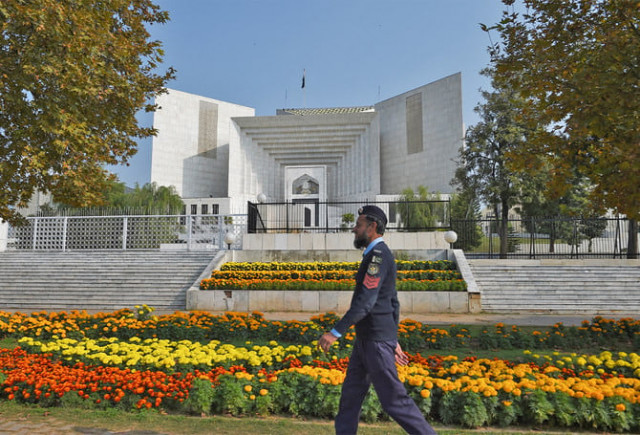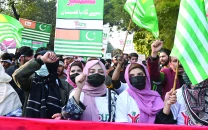CJP urges PTI to rejoin parliament
Top judge wonders why party didn’t object to NAB law tweaks in legislature

The country’s top judge on Tuesday urged the PTI to join parliament in the interest of people and country.
Chief Justice of Pakistan Umar Ata Bandial also wondered as to why PTI MNAs had not objected to the recent amendments to the National Accountability Ordinance in parliament. He observed that PTI leaders should have participated in the parliamentary debate regarding amendments to the NAO.
A three-judge special bench of the apex court was hearing PTI chairman and deposed premier Imran Khan's petition against changes in the accountability law. Lawyer Khawaja Haris appeared on behalf of the petitioner.
The bench issued notices to all respondents. The attorney general for Pakistan has also been served a notice for legal assistance. The bench noted that questions raised by the PTI counsel were required for consideration.
During the hearing, the CJP asked PTI Vice President Shah Mahmood Qureshi to come to the rostrum. The CJP asked him why the PTI had not objected to the amendments to the National Accountability Bureau (NAB) law in parliament.
He urged the PTI to consider its position and join the parliament for the sake of people and the country.
He also referred to the country's present economic situation wherein the local currency was depreciating.
Read SC registrar returns PTI plea against NAB law tweaks
The CJP remarked that the functioning of parliament was necessary for the progress of the country.
“Parliament is the sovereign body; we have always held that parliament should be fully functional,” he added.
The top judge observed that several issues brought to judicial bodies were the domain of parliament. “These issues should be debated in parliament so that the court may spend time to decide ordinary litigant cases.”
The CJP also hinted at referring the matter related to amendments to the NAB law to parliament for reconsideration. He added that ultimately this matter would be referred to parliament.
Justice Syed Mansoor Ali Shah also asked the PTI leader on the matter of parliamentary debate. The judge added that serious questions would arise on the locus standi of the petitioner, as to why they did not participate in the debate.
Justice Ijaz ul Ahsan also endorsed the CJP’s view and noted that the PTI had given a “complete walkover” to the government by leaving the parliament. “You could have raised objections to the legislation,” he told Qureshi.
The PTI leader, however, said he did not want to discuss the reason for leaving parliament. However, he added that two attempts were made to amend the NAB law but consensus could not be evolved. He claimed that the PML-N had suggested 34 amendments last time which was not acceptable to them as these could have completely left the accountability law redundant.
As the hearing started, the CJP noted that he was told by the law minister during a Judicial Commission of Pakistan meeting that every amendment was made in view of the SC judgment. Justice Shah asked whether or not the SC could compel legislatures to make law on corruption.
He asked the counsel to refer to any world court which had passed such a direction. Justice Shah added that it had to examine whether or not NAB could be beneficial for the growth of the country. He observed that civil servants were scared of NAB as it was being used as a political tool.
Read More: What is PTI thinking?
Haris, however, argued that there was nothing wrong in the law. However, he admitted that the law had been misused by the persons who were running NAB. Earlier, Haris also said that the parliamentary system and Islamic provisions were features of the Constitution and these amendments affected them.
The counsel also objected to the definition of assets beyond means as well as misuse of authority in the amendments.
He also raised questions on the recent amendment which defined the offence of benami. The counsel contended that under the new amendment, material came through mutual legal assistance (MLA) could not be placed as evidence before an accountability court. He maintained that the amendment was made to benefit those involved in fake account cases.
Justice Ahsan asked whether or not parliament could have unfettered power to carry out any kind of legislation in haste. He also inquired as to whether or not the amendments could be applicable since 1985. When the CJP was dictating in the order that benefits drove from the recent amendments would be subject to the outcome of these proceedings, Additional Attorney General (AAG) Chaudhry Amir Rehman requested that the court should not pass any restraining order until hearing the government’s point of view.
Justice Shah agreed with the AAG’s request. However, the PTI counsel sought a restraining order until the final decision of the petition. Justice Ahsan also endorsed his contention. However, the CJP avoided passing any order -- a move which might suspend the operation of the new law.
The hearing of the case was adjourned until July 29. A lawyer, who witnessed the proceedings, said members of the bench have different perspectives to examine the amendments to the NAB law. He added that the CJP’s opinion would be decisive in this matter.



















COMMENTS
Comments are moderated and generally will be posted if they are on-topic and not abusive.
For more information, please see our Comments FAQ